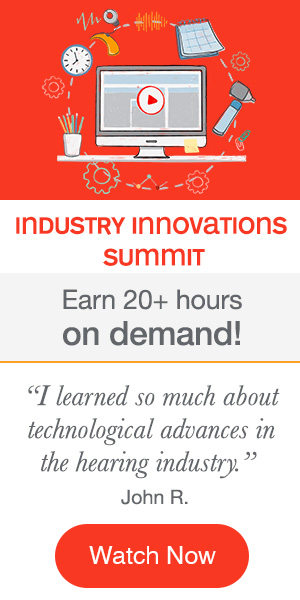Listen Carefully - Starkey Hearing Foundation Initiative to Address Noise Induced Hearing Loss in Teens and Young Adults
Carolyn Smaka: Dave and Taylor, thanks for your time today. Why did the Starkey Hearing Foundation develop the Listen Carefully initiative – what was the driver behind it?
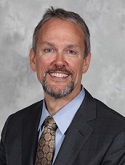
Dave Fabry: A lot of people are familiar with the Starkey Hearing Foundation’s efforts both domestically and internationally to identify, fit hearing aids, and follow up with patients who have hearing loss. The Listen Carefully initiative looks to prevent hearing loss.
With hearing aid market penetration at approximately 20% in the U.S., we feel there’s still plenty of work for Starkey and other manufacturers to address hearing loss that has already occurred, much of which is not preventable. However, the number of preventable hearing losses, particularly among teens and young people, is alarmingly on the rise. The World Health Organization recently made a statement estimating that more than one billion young people around the world are at risk of hearing loss because of recreational noise exposure. That to me is just a staggering number given that we have seven billion people on the planet right now. They cited data indicating that nearly half of 12- to 35-year-olds listen to unsafe sound levels on personal audio devices, and that nearly 40 percent are exposed to dangerous levels in recreational activities.
We think this is already the beginning of an epidemic. Listen Carefully was developed as an initiative to raise awareness about noise-induced hearing loss and prevention of non-occupational noise damage. If you consider the numbers, I would ask you to simply look around you next time you are in a group of people or in a public place. Chances are, about half the people you see are plugged in to standard earplugs, and they’re listening to music. As you know, the brain really doesn’t care what you’re listening to whether it is an annoying noise or your favorite song. The brain cares about the intensity and the duration of sound, and depending on that combination the noise may be damaging. What we’ve seen with the portable listening device generation is that they are unnecessarily exposing themselves in many cases to the same noise levels as the factory workers of decades ago. The result is that one in six teens now has some measurable noise-induced hearing loss caused by loud sounds.
As an aside, I saw this firsthand in a clinical capacity. Before I joined Starkey I was at the University of Miami Medical Center. The University of Miami has an outstanding music program, and we started a program to measure the hearing of every incoming freshman that was a music major. I conducted many of these screenings myself. A number of these students, who were devoting their careers to music and many of whom were prodigy musicians, were already showing signs of noise-induced hearing loss. Many had considerable noise notches on the audiogram, even though they were seventeen or eighteen years old.
Teen hearing loss in the last decade alone has increased by 30%. So that’s why we think this initiative is critically important.
Carolyn: Taylor, tell me about the details of the Listen Carefully program, and how it goes about addressing this alarming issue?
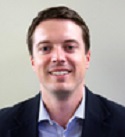
Taylor Joseph: Listen Carefully aims to ensure that the public, particularly young people, are aware of this issue. By getting up to speed on the details of recreational hearing loss, they can take steps to protect their hearing in their daily lives. Dave mentioned portable listening devices, which is one issue. Others include concerts, nightclubs, lawn mowers, and even sporting events.
There was a lot of talk during the past NFL season about Kansas City and Seattle breaking new records in terms of how many decibels they hit in the stadium. The record ended up being more than 140 dB, which can damage hearing in seconds.
Dave: We’re certainly not opposed to fans cheering for their team, but it just makes no sense to put people in a position where you can cause permanent, irreversible damage to hearing. Here in Minnesota, we’ve had people at every home game passing out earplugs for use in the Vikings stadium. We think it’s ridiculous other stadiums are vying to be the loudest NFL stadium without having a program for ensuring they’re not placing their fans at risk for hearing damage.
Even restaurants today can have dangerous noise levels, particularly those that incorporate loud music as part of the ambience or have architectural designs that enhance sound.
Taylor: The goal of Listen Carefully, Carolyn, is to raise awareness of these issues and help to prevent hearing loss. We’ve partnered with athletes and celebrities from Derrick Coleman of the Seattle Seahawks and Larry Fitzgerald of the Arizona Cardinals, to Grammy-nominated musicians like Aloe Blacc and others, to help us spread the message.
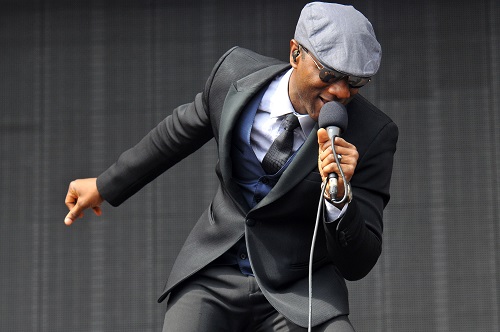
Aloe Blacc
Last fall, we launched a national video contest for middle and high school students. The point of the contest was for students to create thirty-second videos on the issue of noise-induced hearing loss. We know that peers teaching peers is a very impactful way to get a message across. The response to the video contest was fantastic. We had more than 3,000 participants representing all 50 states and received 179 video submissions. From there, we narrowed it down to the qualifying finalists, and had an open nationwide vote. The winning team was from a school in Irvine, California. Aside from each team member receiving a GoPro, Aloe Blacc will play a private concert this spring at the winners’ school. It’s going to be a lot of fun, and will continue to help us raise awareness for the issue.
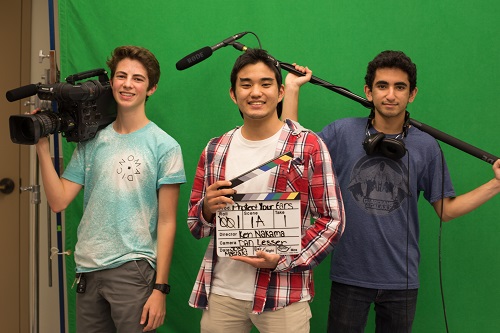
Dan Lesser, Ken Nakama, and Joshua Maslaki of Woddbridge High School, winners of 2015 Listen Carefully video contest
Carolyn: I like the idea of peers teaching peers, because sometimes as professionals and parents we risk sounding preachy. The celebrity involvement is great.
Dave: I think that’s right. We face the same issue with young people as we do with older people who may need a hearing test or hearing aids – we want to create a sense of urgency, without sounding threatening or preachy. In both cases we need to urge people to take action before it’s too late. For people at risk of noise damage, that means taking action to protect their hearing before they have hearing loss, and for people with hearing loss that means getting hearing aids before they begin to suffer some of the cognitive decline.
It’s a similar challenge, and the peer-to-peer messaging is an important part of the communication.
Taylor: It’s been great teaming up with high profile people who kids look up to. Athletes and musicians can help us reach new audiences.
Dave: A few years ago, Starkey invited music producer Dallas Austin and the Massey brothers from Disney, to perform at an assembly at an Eden Prairie Middle School. Eden Prairie is a suburb of Minneapolis, and there were about 1,400 people at the assembly.
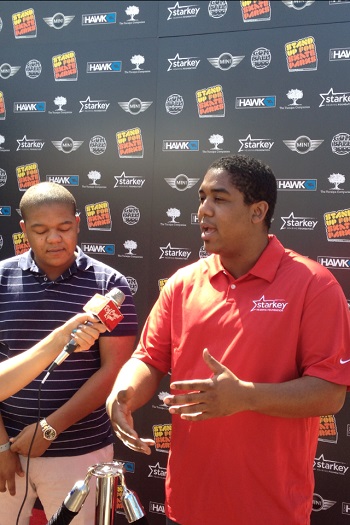
Kyle and Chris Massey
Dallas Austin played some music, and then played some simulations of what the music would sound like if you were listening through a noise-induced hearing loss. The music sounded so dead without much of the high frequencies, as you would hear it with typical noise-induced hearing loss. Then, we demonstrated how the music sounds through acoustic filtering in musicians’ earplugs; in this case, the music is at a lower level but sounds great so you can still enjoy it.
Showing them this was incredibly powerful. A lot of kids might think, I don’t want to wear hearing protection when I go to a concert, or when I go to a club when I’m old enough, because it will destroy the experience. But when they experienced what hearing loss would sound like, and saw what they can do about it, it made all the difference. Having them experience the issue was a more powerful educational tool than just saying “this is bad” or finger wagging.
Taylor: Hearing is something most people take for granted. We think it will just always be there; we depend on it every day without even realizing it. By spreading the Listen Carefully message, we get people thinking about hearing, and its importance in connecting us with other people and in all of our day-to-day interactions.
Dave: I’ve had the good fortune to travel with the Starkey Hearing Foundation to various emerging countries around the world to work with individuals with hearing loss. On these trips we see hearing losses caused by malaria, meningitis, measles and even untreated middle ear disease. Globally, untreated middle ear disease is still a significant issue and can lead to permanent hearing loss, and even death.
When we see people who have hearing loss who don’t have access to audiologists, hearing care or even basic healthcare it is particularly hard for me to think that 1.1 billion people are putting themselves at risk for non-occupational, noise-induced hearing loss. These are largely teens and young adults in high income countries like the U.S., and the type of hearing loss is wholly preventable. It’s different sides of the same coin. On the one hand, we have a collective responsibility to raise awareness about malaria drugs and otoxicity, and on the other had we have to communicate about non-occupational sources of potentially dangerous sound. As Taylor said, hearing is so often taken for granted until it’s gone, and then it’s too late.
Hearing loss is a global epidemic. There are many preventable and non-preventable causes, and we really want to work to eradicate as many of the preventable causes as possible. We believe the Listen Carefully initiative will help us to do that.
Carolyn: It’s a great initiative and we wish you all the best with it. Thanks Dave and Taylor for taking time to discuss it here today. More information is available at https://www.listencarefully.org

